#wilmon becoming an artistic family
Explore tagged Tumblr posts
Text
thinking about writer wille. poet wille. literature student wille. wille, obsessed with writers and poets and literature and having shelves filled with books and lighting candles and writing books and reading books and highlighting his favorite lines in books and learning all these little poems and writing them on sticky notes for simon to read in the morning when he has to leave before simon wakes up and writing his own poems for simon and maybe even getting into song writing, maybe even writing song lyrics for/with simon and both of them finding it easier to express their feelings through writing and singing rather than talking and creating all these artworks together and healing through art and.
#young royals#wilmon#simon eriksson#wilhelm#prince wilhelm#wilhelm young royals#literature student wille#poet wille#my beloved#wilmon becoming an artistic family#I'm so sick#wilmon writing songs together save me
47 notes
·
View notes
Text
Some more young royals fanfic recommendations for you to enjoy
What lies within | chaptered | completed | by museraphoria
Wilhelm is barely fifteen when he becomes the sole survivor of a tragedy that takes the lives of his entire family. Lost between guilt and grief, Wilhelm finds himself wielding powers he never asked for, and forced to give up his only chance at a normal life.
As he attempts to pick up the pieces of his former self, his best friend Simon remains by his side, more than willing to embark on this journey with him. While Wilhelm trains to wage war on crime and injustice, his feelings for Simon start to change, and he soon must choose between living a lie or risking to lose the person who matters the most to him.
or, the Wilmon!Superhero AU everyone deserved
I don’t think I had ever read a superhero AU before so this was fun! I loved the way the characters were written and it’s one I definitely need to reread.
Oh love, tell me we’re not tragic | chaptered | completed | by starrystoryteller
"You got to be fucking kidding me," He sighs, his mom sending him a pointed look at his choice of words. He tries to twist his features into an apologetic expression but it's a lost cause as his eyes stay glued to the image on the television. He narrows his sight in on the youngest of the princes, eyes catching on the badly covered scar just under his eye. The Crown's attempt at covering up his mistake is futile.
an enemies to fwb to lovers wilmon fic
This is like the definition of idiots in love, where you just want to smash them together and make them see sense. I loved it.
You’re the cutest Jailbird I ever did see | oneshot | completed | by pagegirlintraining and TheAmberFox / @pagegirlintraining @the-amber-fox
If you asked Simon and Wille, neither of them could tell you exactly how they ended up inside a cell at the Bjärstad police department for getting in a fight with August and his friends. The thing is, neither of them is mad that they ended up there together. Will our two favourite idiots figure out by themselves why they are ready to smack people for each other or will it take some princely meddling?
They are the absolute cutest in that fic, and there’s one thing I enjoyed very much. Anything by those two authors (both separately and as a duo) is amazing and this is no exception.
You are unbreaking | chaptered | completed | by unfortunate17 / @unfortunate17
The dagger at Simon’s hip weighs more than it had when he’d first strapped it to himself this morning.
Wille gentles an arm around his shoulders, pointing out exotic birds and plants, explaining their respective habitats, their food habits. The vulnerable skin of his throat is unguarded, the tender flesh near his heart covered only by thin, white cotton. It would be quick, Simon promises himself, painless even. Wilhelm need not unnecessarily suffer.
“– back inside?”
Simon blinks up at him.
Wille’s shading his eyes, brows knitted together in faint concern as he looks down at him.
Simon feels himself flush. “Sorry, I missed what you said.”
Or, Wille is the second born son of Queen Kristina. Simon is the fool who marries him with the goal of assassinating him and bringing an end to the tyrannical monarchy. It doesn't go according to plan.
I was on the edge of my seat with this one. I love this kind of more medieval setting and the premise of that one?? Simon being there to assassinate Wille? Sign me UP. You won’t be disappointed.
I love the way you lie | chaptered | completed | by itsme_hi_imtheproblem / @iwouldnevergetintofanfic
Prince Wilhelm can't seem to catch a break. When he is pulled into yet another scandal through no fault of his own, he is desperate enough to try one last thing to salvage his image: A publicly staged fake relationship.
Simon Eriksson is a struggling young artist, trying to make a name for himself and tired of the obstacles he faces on his way into the music industry. He'll take any publicity at this point.
A pact is made. Strictly business.
What could possibly go wrong?
When done right (for my taste ofc, there’s no real right or wrong way in creativity and art!!), I love a good fake relationship. And this one is done super right imo. Erik is alive, and wilmon is full of feelings and I was too when reading.
You don’t have to hurt anymore | chaptered | completed | by wilmonxoxo
Running from his mother and her unattainable expectations, Wilhelm finds solace at his brother’s house in Bjärstad. It was there he found a sense of belonging, a sense of hope, that, maybe one day, he too could be brave like Erik and leave his tumultuous household.
It only took one night for the boy next door to catch his eye. The boy who lived in the house where screaming and fighting seemed to be a constant, who shooed away help like his life depended on it but seemed to crave it so deeply in his soft brown eyes.
“I just wanna be friends with you. Everyone needs a friend.”
"Bullshit.”
Because since the first night they met, Simon saw the way Wilhelm looked at him. It was the way this whole fucking town looked at him but worse. Like he was broken, weak, someone who needed to be saved by the cute, privileged boy next door even though he’d been protecting his family for as long as he could remember - even the one who was destroying them.
"Why do you say that?”
“Because I see the way you look at me, Wille."
Because I think I might look at you the same way and I don’t just wanna be friends with you, either.
This one was very interesting to read and pretty angsty (at least to me, I don’t read much heavy angst). I loved how important of a role Erik had too. Very interesting dynamics.
Other recs: part 1, part 2, part 3, part 4, part 5, part 6
102 notes
·
View notes
Text
Mahalia Jackson
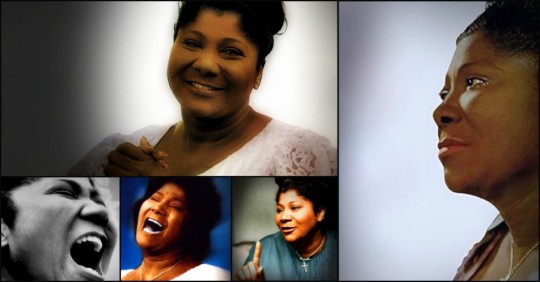
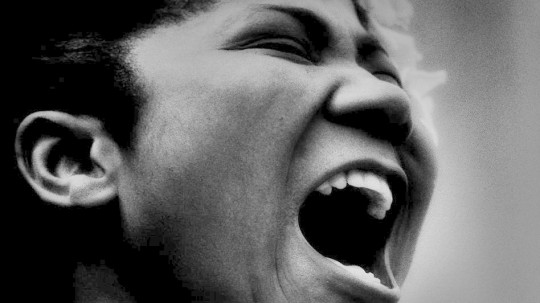
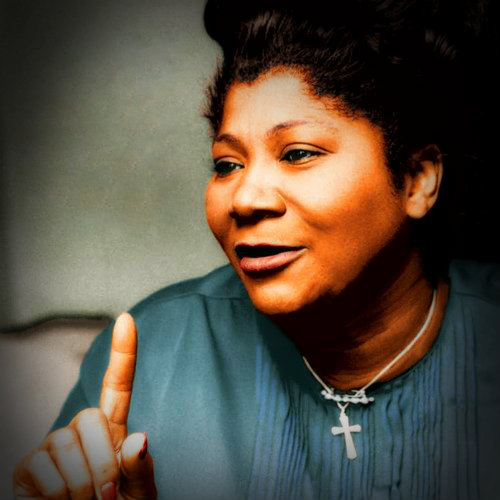
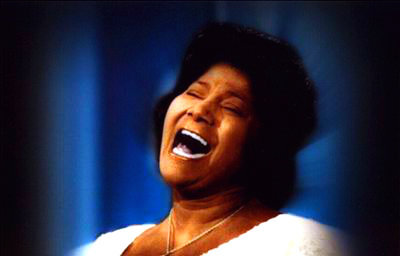
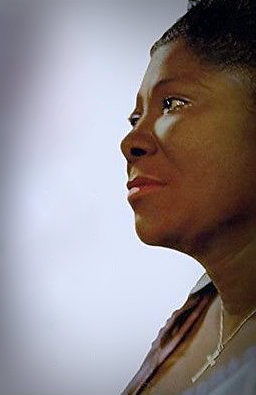
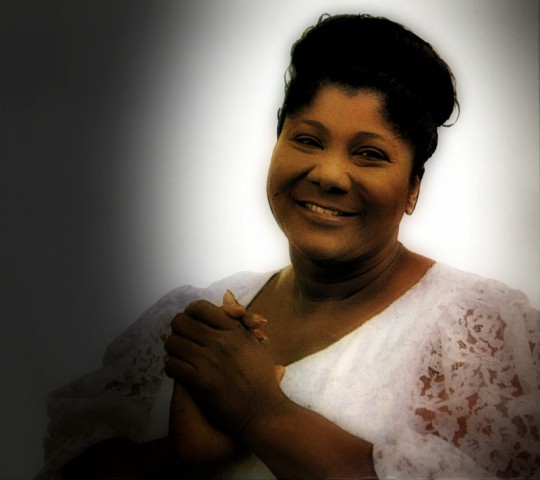
Mahalia Jackson (/məˈheɪljə/ mə-HAYL-yə; October 26, 1911 – January 27, 1972) was an American gospel singer. Possessing a powerful contralto voice, she was referred to as "The Queen of Gospel". She became one of the most influential gospel singers in the world and was heralded internationally as a singer and civil rights activist. She was described by entertainer Harry Belafonte as "the single most powerful black woman in the United States". She recorded about 30 albums (mostly for Columbia Records) during her career, and her 45 rpm records included a dozen "golds"—million-sellers.
"I sing God's music because it makes me feel free", Jackson once said about her choice of gospel, adding, "It gives me hope. With the blues, when you finish, you still have the blues."
Early life
She was born on October 26, 1911 as Mahala Jackson and nicknamed "Halie". Jackson grew up in the Black Pearl section of the Carrollton neighborhood of uptown New Orleans. The three-room dwelling on Pitt Street housed thirteen people and a dog. This included Little Mahala (named after her aunt, Mahala Clark-Paul whom the family called Aunt Duke); her brother Roosevelt Hunter, whom they called Peter; and her mother Charity Clark, who worked as both a maid and a laundress. Several aunts and cousins lived in the house as well. Aunt Mahala was given the nickname "Duke" after proving herself the undisputed "boss" of the family. The extended family (the Clarks) consisted of her mother's siblings: Isabell, Mahala, Boston, Porterfield, Hannah, Alice, Rhoda, Bessie, their children, grandchildren, and patriarch Rev. Paul Clark, a former slave. Jackson's father, John A. Jackson, Sr. was a stevedore (dockworker) and a barber who later became a Baptist minister. He fathered five other children besides Mahalia: Wilmon (older) and then Yvonne, Edna, Pearl, and Johnny, Jr. (by his marriage shortly after Halie's birth). Her father's sister, Jeanette Jackson-Burnett, and her husband, Josie, were vaudeville entertainers. Their son, her cousin Edward, shared stories and records of Ma Rainey, Mamie Smith, and Bessie Smith whose voices and blues singing impressed her so much that she would imitate their ways of bending and coloring notes. (Her voice and singing style would be compared to Bessie Smith's all her life).
At birth, Jackson suffered from genu varum, or "bowed legs". The doctors wanted to perform surgery by breaking her legs, but one of the resident aunts opposed it. Jackson's mother would rub her legs down with greasy dishwater. The condition never stopped young Jackson from performing her dance steps for the white woman for whom her mother and Aunt Bell cleaned house.
Jackson was four (or five) years old when her mother Charity died (at the age of 25), leaving her family to decide who would raise Halie and her brother. Aunt Duke assumed this responsibility, and the children were forced to work from sun-up to sun-down. Aunt Duke would always inspect the house using the "white glove" method. If the house was not cleaned properly, Jackson was beaten. If one of the other relatives could not do their chores or clean at their job, Jackson or one of her cousins was expected to perform that particular task. School was hardly an option. Jackson loved to sing and church is where she loved to sing the most. Her Aunt Bell told her that one day she would sing in front of royalty, a prediction that would eventually come true. Jackson began her singing career at the local Mount Moriah Baptist Church. At 12 years old, she was baptized in the Mississippi River by Mt. Moriah's pastor, the Rev. E.D. Lawrence, then went back to the church to "receive the right hand of fellowship".
Career
1920s–1940s
In 1927, at the age of 16, Jackson moved to Chicago, Illinois, in the midst of the Great Migration. After her first Sunday school service, where she had given an impromptu performance of her favorite song, "Hand Me Down My Silver Trumpet, Gabriel", she was invited to join the Greater Salem Baptist Church Choir. She began touring the city's churches and surrounding areas with the Johnson Gospel Singers, one of the earliest professional gospel groups. In 1929, Jackson met the composer Thomas A. Dorsey, known as the Father of Gospel Music. He gave her musical advice, and in the mid-1930s they began a 14-year association of touring, with Jackson singing Dorsey's songs in church programs and at conventions. His "Take My Hand, Precious Lord" became her signature song.
In 1936, Jackson married Isaac Lanes Grey Hockenhull ("Ike"), a graduate of Fisk University and Tuskegee Institute who was 10 years her senior. She refused to sing secular music, a pledge she would keep throughout her professional life. She was frequently offered money to do so and she divorced Isaac in 1941 because of his unrelenting pressure on her to sing secular music and his addiction to gambling on racehorses.
In 1931, Jackson recorded "You Better Run, Run, Run". Not much is known about this recording and no publicly known copies exist. Biographer Laurraine Goreau cites that it was also around this time she added the "i" to her name, changing it from Mahala to Mahalia, pronounced /məˈheɪliə/. At the age of 25, her second set of records was recorded on May 21, 1937, under the Decca Coral label, accompanied by Estelle Allen (piano), in order: "God's Gonna Separate The Wheat From The Tares", "My Lord", "Keep Me Everyday" and "God Shall Wipe All Tears Away". Financially, these were not successful, and Decca let her go.
In 1947, Jackson signed up with the Apollo label, and in 1948, recorded the William Herbert Brewster song "Move On Up a Little Higher", a recording so popular stores could not stock enough copies to meet demand, selling an astonishing eight million copies. (The song was later honored with the Grammy Hall of Fame Award in 1998.) The success of this record rocketed her to fame in the U.S., and soon after, in Europe. During this time she toured as a concert artist, appearing more frequently in concert halls and less often in churches. As a consequence of this change in her venues, her arrangements expanded from piano and organ to orchestral accompaniments.
Other recordings received wide praise, including "Let the Power of the Holy Ghost Fall on Me" (1949), which won the French Academy's Grand Prix du Disque; and "Silent Night", which became one of the best-selling singles in the history of Norway. When Jackson sang "Silent Night" on Denmark's national radio, more than 20,000 requests for copies poured in. Other recordings on the Apollo label included "He Knows My Heart" (1946), "Amazing Grace" (1947), "Tired" (1947), "I Can Put My Trust in Jesus" (1949), "Walk with Me" (1949), "Let the Power of the Holy Ghost Fall on Me" (1949), "Go Tell It on the Mountain" (1950), "The Lord's Prayer" (1950), "How I Got Over" (1951), "His Eye Is on the Sparrow" (1951), "I Believe" (1953), "Didn't It Rain" (1953), "Hands of God" (1953) and "Nobody Knows" (1954).
1950s–1970s
In 1950, Jackson became the first gospel singer to perform at Carnegie Hall when Joe Bostic produced the Negro Gospel and Religious Music Festival. She started touring Europe in 1952 and was hailed by critics as the "world's greatest gospel singer". In Paris she was called the Angel of Peace, and throughout the continent she sang to capacity audiences. The tour, however, had to be cut short due to exhaustion. She began a radio series on CBS and signed to Columbia Records in 1954. A writer for Down Beat music magazine stated on November 17, 1954: "It is generally agreed that the greatest spiritual singer now alive is Mahalia Jackson." Her debut album for Columbia was The World's Greatest Gospel Singer, recorded in 1954, followed by a Christmas album called Sweet Little Jesus Boy and Bless This House in 1956.
With her mainstream success, Jackson was criticized by some gospel purists who complained about her hand-clapping and foot-stomping and about her bringing "jazz into the church". She had many notable accomplishments during this period, including her performance of many songs in the 1958 film St. Louis Blues, singing "Trouble of the World" in 1959's Imitation of Life, and recording with Percy Faith. When she recorded The Power and the Glory with Faith, the orchestra arched their bows to honor her in solemn recognition of her great voice. She was the main attraction in the first gospel music showcase at the Newport Jazz Festival in 1957, which was organized by Joe Bostic and recorded by the Voice of America and performed again in 1958 (Newport 1958). She was also present at the opening night of Chicago's Old Town School of Folk Music in December 1957. In 1961, she sang at John F. Kennedy's inaugural ball. She recorded her second Christmas album Silent Night (Songs for Christmas) in 1962. By this time, she had also become a familiar face to British television viewers as a result of short films of her performing that were occasionally shown.
At the March on Washington in 1963, Jackson sang in front of 250,000 people "How I Got Over" and "I Been 'Buked and I Been Scorned". Martin Luther King, Jr. made his famous "I Have a Dream" speech there. She also sang "Take My Hand, Precious Lord" at his funeral after he was assassinated in 1968. She sang to crowds at the 1964 New York World's Fair and was accompanied by "wonderboy preacher" Al Sharpton. She toured Europe again in 1961 (Recorded Live in Europe 1961), 1963–64, 1967, 1968 and 1969. In 1970, she performed for Liberian President William Tubman.
Jackson's last album was What The World Needs Now (1969). The next year, in 1970, she and Louis Armstrong performed "Just a Closer Walk with Thee" and "When the Saints Go Marching In" together. She ended her career in 1971 with a concert in Germany, and when she returned to the U.S., made one of her final television appearances on The Flip Wilson Show. She devoted much of her time and energy to helping others. She established the Mahalia Jackson Scholarship Foundation for young people who wanted to attend college. For her efforts in helping international understanding, she received the Silver Dove Award. Chicago remained her home until the end. She opened a beauty parlor and a florist shop with her earnings, while also investing in real estate ($100,000 a year at her peak).
In 1970, she guest-starred on episode 56 of Sesame Street, singing "He's Got the Whole World in His Hands", followed by Gordon Robinson (played by Matt Robinson) finding hidden E's.
Civil rights movement
Jackson played an important role during the civil rights movement. In August 1956, she met Ralph Abernathy and Martin Luther King, Jr. at the National Baptist Convention. A few months later, both King and Abernathy contacted her about coming to Montgomery, Alabama, to sing at a rally to raise money for the bus boycott. They also hoped she would inspire the people who were getting discouraged with the boycott.
Despite death threats, Jackson agreed to sing in Montgomery. Her concert was on December 6, 1956. By then, the U.S. Supreme Court had ruled in Browder v. Gayle that bus segregation was unconstitutional. In Montgomery, the ruling was not yet put into effect, so the bus boycott continued. At this concert she sang "I've Heard of a City Called Heaven", "Move On Up a Little Higher" and "Silent Night". There was a good turnout at the concert and they were happy with the amount of money raised. However, when she returned to the Abernathy's home, it had been bombed. The boycott finally ended on December 21, 1956, when federal injunctions were served, forcing Montgomery to comply with the court ruling.
Although Jackson was internationally known and had moved up to the northern states, she still encountered racial prejudice. One account of this was when she tried to buy a house in Chicago. Everywhere she went, the white owners and real estate agents would turn her away, claiming the house had already been sold or they changed their minds about selling. When she finally found a house, the neighbors were not happy. Shots were fired at her windows and she had to contact the police for protection. White families started moving out and black families started moving in. Everything remained the same in her neighborhood except for the skin color of the residents.
King and Abernathy continued to protest segregation. In 1957, they founded the Southern Christian Leadership Conference (SCLC). The first major event sponsored by the SCLC was the Prayer Pilgrimage for Freedom in Washington, D.C., on May 17, 1957, the third anniversary of the Brown v. Board of Education decision. From this point forward, Jackson appeared often with King, singing before his speeches and for SCLC fundraisers. In a 1962 SCLC press release, he wrote she had "appeared on numerous programs that helped the struggle in the South, but now she has indicated that she wants to be involved on a regular basis". Jesse Jackson said when King called on her, she never refused, traveling with him to the deepest parts of the segregated South.
At the March on Washington for Jobs and Freedom in 1963, Jackson performed "I Been 'Buked and I Been Scorned", before King gave his "I Have a Dream" speech. Toward the end of the speech, he departed from his prepared text for a partly improvised peroration on the theme "I have a dream", prompted by Jackson's cry: "Tell them about the dream, Martin!"
Jackson said that she hoped her music could "break down some of the hate and fear that divide the white and black people in this country". She also contributed financially to the movement.
Death
Jackson died in Chicago on January 27, 1972 at Little Company of Mary Hospital in Evergreen Park, Illinois, of heart failure and diabetes complications. Two cities paid tribute: Chicago and New Orleans. Beginning in Chicago, outside the Greater Salem Baptist Church, 50,000 people filed silently past her mahogany, glass-topped coffin in final tribute to the queen of gospel song. The next day, as many people who could—6,000 or more—filled every seat and stood along the walls of the city's public concert hall, the Arie Crown Theater of McCormick Place, for a two-hour funeral service. Her pastor, Rev. Leon Jenkins, Mayor Richard J. Daley, and Mrs. Coretta Scott King eulogized her during the Chicago funeral as "a friend – proud, black and beautiful". Sammy Davis, Jr., and Ella Fitzgerald paid their respects. Joseph H. Jackson, president of the National Baptist Convention, U.S.A., Inc., delivered the eulogy at the Chicago funeral. Aretha Franklin closed the Chicago rites with a moving rendition of "Precious Lord, Take My Hand".
Three days later, a thousand miles away, the scene repeated itself: again the long lines, again the silent tribute, again the thousands filling the great hall of the Rivergate Convention Center in downtown New Orleans this time. Mayor Moon Landrieu and Louisiana Governor John J. McKeithen joined gospel singer Bessie Griffin. Dick Gregory praised Jackson's "moral force" as the main reason for her success. Lou Rawls sang "Just a Closer Walk With Thee". The funeral cortège of 24 limousines drove slowly past her childhood place of worship, Mt. Moriah Baptist Church, where her recordings played through loudspeakers. The procession made its way to Providence Memorial Park in Metairie, Louisiana, where she was entombed. Despite the inscription of her birth year on her gravestone as 1912, she was actually born in 1911. Among her surviving relatives are her great-nephews, NBA basketball player Danny Granger and soul artist Scotty Granger.
Jackson's estate was reported at more than four million dollars. Some reporters estimated record royalties, television and movie residuals, and various investments made it worth more. The bulk of the estate was left to a number of relatives, many of whom cared for her during her early years. Among principal heirs were relatives including her half-brother, John Jackson, and aunt, Hannah Robinson. Neither of her ex-husbands, Isaac Hockenhull (1936–1941) and Sigmund Galloway (1964–1967), were mentioned in her will.
Legacy and honors
Jackson's music was played widely on gospel and Christian radio stations, such as Family Radio. Her good friend Martin Luther King, Jr., said, "A voice like this one comes not once in a century, but once in a millennium." She was a close friend of Doris Akers, one of the most prolific gospel composers of the 20th century. In 1958, they cowrote the hit "Lord, Don't Move the Mountain". Mahalia also sang many of Akers' own compositions such as "God Is So Good to Me", "God Spoke to Me One Day", "Trouble", "Lead On, Lord Jesus" and "He's a Light Unto My Pathway", helping Akers to secure her position as the leading female Gospel composer of that time. In addition to her singing career, she mentored the legendary soul singer Aretha Franklin. Jackson was also good friends with Dorothy Norwood and fellow Chicago-based gospel singer Albertina Walker, and she discovered a young Della Reese. On the 20th anniversary of her death, Smithsonian Folkways Recording commemorated her with the album I Sing Because I'm Happy, which includes interviews about her childhood conducted by Jules Scherwin.
American Idol winner and Grammy Award-winning R&B singer Fantasia Barrino has been cast to play Jackson in a biographical film about her life. It will be based on the 1993 book Got to Tell It: Mahalia Jackson, Queen of Gospel. It is said to be directed by Euzhan Palcy, according to The Hollywood Reporter.
The National Academy of Recording Arts & Sciences created the Gospel Music or Other Religious Recording category for Jackson, making her the first gospel music artist to win the prestigious Grammy Award.
In December 2008, she was inducted into The Louisiana Music Hall of Fame.
A prominent namesake in her native New Orleans is the Mahalia Jackson Theater of the Performing Arts, which was remodeled and reopened on January 17, 2009, with a gala ceremony featuring Plácido Domingo, Patricia Clarkson, and the New Orleans Opera directed by Robert Lyall.
Mahalia Jackson was inducted as a Laureate of The Lincoln Academy of Illinois and awarded the Order of Lincoln (the State’s highest honor) by the Governor of Illinois in 1967 in the area of The Performing Arts.
Selective awards and honors
Grammy Award historyGrammy Hall of Fame
Jackson was posthumously inducted into the Grammy Hall of Fame, a special Grammy award established in 1973 to honor artists whose recordings are at least twenty-five years old and have "qualitative or historical significance". Jackson is a three-time inductee as of 2015.
Honors
Well-known songs
In popular culture
Jackson appears in the 1960 film Jazz on a Summer's Day – an artistic documentary filmed at the 1958 Newport Jazz Festival. She sings three gospel numbers at the end of the film, including "The Lord's Prayer".
In the 1958 movie St. Louis Blues, Jackson played the character Bessie May and sang in the church choir.
In the movie Jungle Fever, the character played by Ossie Davis tries to distract himself from his son Gator's (Samuel L. Jackson) crack cocaine addiction by listening to her albums by the hour.
In the 1959 film Imitation of Life, Jackson portrays the choir soloist, singing "Trouble of the World" at Annie's funeral. She has no speaking lines, but her singing performance highlights the climactic scene.
In the 1964 film The Best Man, Jackson plays herself, singing at a Democratic Convention in a two-minute clip.
In the television promotional special This Way to Sesame Street, Ernie mentions Jackson as one of the celebrities who occasionally visit Sesame Street.
Duke Ellington, with whom Jackson occasionally recorded, most notably on the studio version of Black, Brown and Beige, paid tribute to her on his New Orleans Suite album with the song "Portrait of Mahalia Jackson".
In the 1970 documentary movie Elvis: That's the Way It Is, Elvis Presley jokes with one of his back-up singing groups The Sweet Inspirations that, "I'm gonna bring in the Supremes tomorrow night, you know. And Mahalia Jackson singing lead with them."
Alan Parker's 1988 film Mississippi Burning starts with Jackson's famous recording of "Take My Hand, Precious Lord" over the opening credits, over a poignant scene of a pair of segregated water fountains.
In the 2014 film Selma, she is portrayed by singer Ledisi.
Columbia Records discography
World's Greatest Gospel Singer
Sweet Little Jesus Boy
Bless This House
You'll Never Walk Alone
Gospels, Spirituals, & Hymns (1956)
Live at Newport 1958
Great Gettin' Up Morning
Come On Children, Let's Sing
The Power and the Glory
I Believe
Everytime I Feel the Spirit
Recorded Live in Europe During Her Latest Concert Tour
Great Songs of Love and Faith
Make a Joyful Noise Unto the Lord
Silent Night
Mahalia Jackson's Greatest Hits
Let's Pray Together
Mahalia
Garden of Prayer
My Faith
Mahalia Jackson in Concert Easter Sunday, 1967
A Mighty Fortress
Christmas With Mahalia
Mahalia Sings the Gospel Right Out of the Church
What the World Needs Now
Compilations
Nobody Knows the Trouble I've Seen (1975) Vogue
The Best of Mahalia Jackson Hymns, Spirituals & Songs of Inspiration (1976)
Mahalia Jackson's Greatest Hits (1988) Columbia Records
Mahalia Jackson: The Apollo Sessions 1946–1951 (re-issued 1994) Pair Records
The Forgotten Recordings (2005) Acrobat
Wikipedia
10 notes
·
View notes